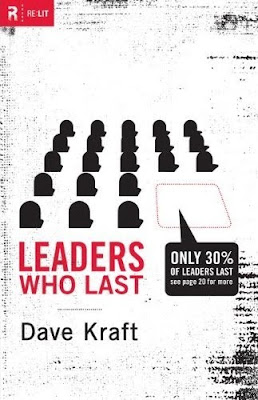 The title of this book made me want to read it. The first two sentences made me want to read it even more. In his foreword, Mark Driscoll writes: “Pastor Dave Kraft is in the right season of life to write this book. By the time this book is published he will be seventy years of age” (p. 11). That was enough to make me want to listen, and listen hard, to what this man had to say. So, I read the book in three different sittings in a thirty-six hour time frame. I’m glad I did.
The title of this book made me want to read it. The first two sentences made me want to read it even more. In his foreword, Mark Driscoll writes: “Pastor Dave Kraft is in the right season of life to write this book. By the time this book is published he will be seventy years of age” (p. 11). That was enough to make me want to listen, and listen hard, to what this man had to say. So, I read the book in three different sittings in a thirty-six hour time frame. I’m glad I did.Dave Kraft is a good writer, with a simple, straightforward style. The book is clear and confident. Kraft knows what he wants to say to leaders and says it. I was immediately drawn in with the book’s clear flow-of-thought, which is evident from the contents.
Part One: Foundations
Chapter 1. The Leader’s Power
Chapter 2. The Leader’s Purpose
Chapter 3. The Leader’s Passion
Chapter 4. The Leader’s Priorities
Chapter 5. The Leader’s Pacing
Part Two: Formation
Chapter 6. The Leader’s Calling
Chapter 7. The Leader’s Gifts
Chapter 8. The Leader’s Character
Chapter 9. The Leader’s Growth
Part Three: Fruitfulness
Chapter 10. The Leader’s Vision
Chapter 11. The Leader’s Influence
Chapter 12. The Leader’s Legacy
The chapters are short, to the point, and seasoned with good illustrations and striking quotations of leaders from a variety of different contexts. For example, here’s a great quotation about character from the legendary coach, John Wooden: “Be more concerned with your character than with your reputation, because your character is what you really are while your reputation is merely what others think you are” (p. 98). There are lots of these leadership maxims scattered through the book, so read with a highlighter handy. You’ll want to remember some of these.
But even more important is the wisdom with which Dave Kraft writes. One gets the sense in reading these pages that he is a man who has lived intentionally and maintained a learning posture throughout his life. His insights and convictions come through loud and clear and without apology. Here are a few that caught my attention. (Keep in mind that this is a book written primarily for people in Christian leadership.)
• “Leadership begins and ends with a clear understanding of the gospel and being rooted in the grace of Jesus Christ as a gift.” (p. 29)
• “It is vitally important that each of us discovers his own pathway to deep intimacy with the Lord Jesus Christ.” (p. 32)
• “Passion will have more of an impact than personality.” (p. 50)
• “If a person’s gift mix is not predominantly in the speaking category, that person should not consider a major leadership role.” (p. 89)
• “A lifelong learner asks all kinds of questions, reads broadly, writes down new ideas, learns from opposing thoughts, and is growing in Christian character.” (p. 113)
• “Be careful with whom you spend the bulk of your time. A leader influences many by investing in a few and letting those few influence the rest.” (p. 128)
• “Today, the crying need is for more leaders. To grow by addition, you recruit more followers. To grow by multiplication, you add more leaders.” (p. 139)
And, the most importance sentence in the book (for me): “If you need people, you can’t lead people.” Now that’s a hard saying, but a very important insight. The following sentences put in context. “There is an inability or lack of desire to make the tough calls, speak the truth, or do the hard things. Motivated by a fear of disappointing people, this inability will seriously hamper and work against your ability to lead.” (p. 132)
These, however, are just a few of the gems found in this wise and helpful book. Most of the chapters also include helpful, practical advice about how to implement the principles being taught. For example, the chapter on priorities (building on the previous chapters) outlines an eight step process for determining how and where to spend your time, moving you through purpose, passion, goals, plans, priorities, schedule, execution, and evaluation. It’s a fairly simple approach, but it’s doable – as is all the other advice Kraft gives.
So, I highly recommend this book. Though it is a brief book and doesn’t say everything that can or should be said about leadership, what it does say is said well and sticks. Kraft’s Leaders Who Last has a quality similar to J. Oswald Sanders’ classic Spiritual Leadership from a generation ago. If I could summarize what I appreciate most about this book into three brief things it would be these: (1) There is a strong emphasis on depth of personal devotion to Jesus, out of which flows everything else. (2) There is a strong emphasis on multiplying leaders. (3) It is written by someone who has done it for over forty years. ‘Nough said.
NOTE: If you found this review helpful, give me a helpful vote on Amazon by clicking here.

No comments:
Post a Comment